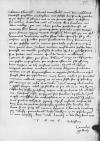List #620
Conradus GOCLENIUS (WACKERS) do Ioannes DANTISCUSLeuven (Lovanium), 1531-05-[12]
| odebrano [Ghent (Gandavum)], [1531]-05-14 Rękopiśmienne podstawy źródłowe:
Pomocnicze podstawy źródłowe:
Publikacje:
| ||||||||||||||||||||||||
Tekst + aparat krytyczny + komentarzZwykły tekstTekst + komentarzTekst + aparat krytyczny
Reverendissimo domino
Salutem plurimam.
Quod munusculum meum boni consulueris, Dantisce, praesulum eruditissime, non potest dici quam mihi gratuler. Et qui
Tuae Reverendissimae
D(ominationi) or D(ominationis)⌈D(ominationi)D(ominationi) or D(ominationis)⌉
deditissimus


 AAWO, AB, D. 3, f.46v
AAWO, AB, D. 3, f.46v